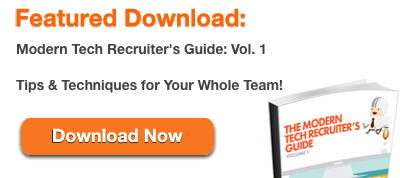You've thoroughly researched your candidate. You've sent them a personalized, flattering, yet serious email.  They're starting to see why your organization would be a good fit, and they've agreed to meet the team.
They're starting to see why your organization would be a good fit, and they've agreed to meet the team.
Well done, stud or studette recruiter! But there's still a long way to go if you're going to land your company's next big hire. If you want to see your candidate progress through the hiring cycle, you need to set up your team to ask the kind of questions that will help them get the most accurate view of the candidate. To do this, host a pre-interview pow-wow with all the interviewers, where you can delineate who is going to ask what and make sure you avoid any repititive overlap in questions.
At Entelo, these prep sessions typically last 15-20 minutes, and include every interviewer. We discuss the background of the candidate, who they've met with on the team so far, and address the positives as well as potential concerns. The goal of this part of the session is to ensure interviewers can have an informed and well--rounded view of the candidate before interviewing. Putting more information about the candidate on the table can be helpful in removing biases or preconceived notions.
The second part of the prep session is to make sure that the interviewers have their area of focus for the interview so that everyone is not asking the same questions over and over. The benefits of doing this are two fold:
- Provides an excellent candidate experience, as answering the same question over and over again can be frustrating
- Your team can explore as many areas as possible in a short amount of time
Now's the time to start dividing topics and questions. Here's how we break it down:
And when it comes down to dividing interview responsibilities, here's how we break it down:
Executives
- What’s an opinion you hold that most people disagree with?
- If you had 10 years to live, what would you do?
- Why should we hire you?
Hiring Managers
Focus on the team/division and specific job fit. What are the expectations of the role? How will they be assessed? Be sure the hiring manager explains how the team is currently structured, what projects they will be working on and with whom, and how this position fits in with the overall division of the company. The hiring manager will also be the one to answer most of the questions the candidate has, as they likely have the most intimate knowledge of what the role requires.
- Describe a time when your team did not agree
- How would you describe your current supervisor?
- Describe a situation when your work was criticized
Team Members
- What did you learn at [pick company name]? What got you into X?
- Tell me about your side projects
- What were your biggest accomplishments in your last job? In your career?
Recruiters
Sample questions:
- What can you do for our company that no one else can?
- What interests you most about this company?
- What’s an ideal work environment for you?
How do you go about dividing interview responsibilities? Leave a comment or tweet at @EnteloRob!


